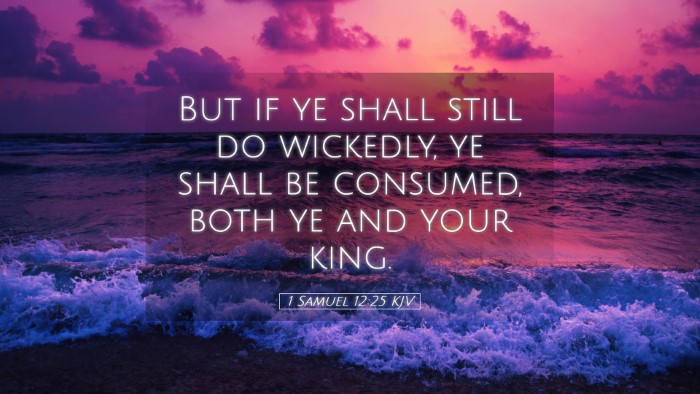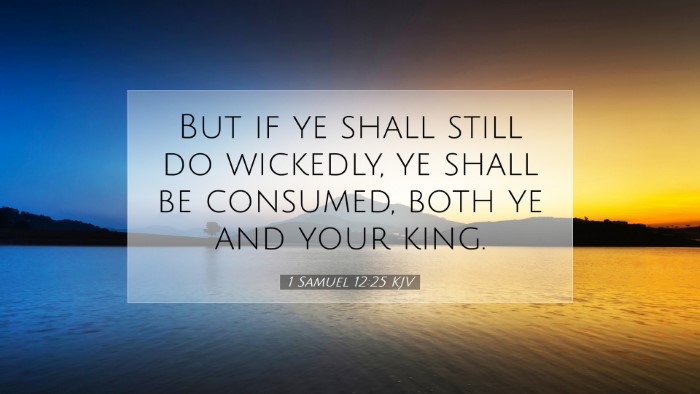Commentary on 1 Samuel 12:25
Verse: "But if you still do wickedly, you shall be swept away, both you and your king."
Introduction
This verse concludes a significant and poignant address by Samuel, the last judge and the first prophet in Israel. It serves as both a warning and a reflection on the covenant relationship between God and His people. This commentary aims to draw from the insights of renowned commentators such as Matthew Henry, Albert Barnes, and Adam Clarke to provide a rich understanding of this verse's theological implications.
Contextual Background
In the preceding chapter, the Israelites had demanded a king, which Samuel communicated to God. Though this request grieved Samuel, God allowed it, indicating His sovereignty over Israel's governing authority. Samuel's address in this chapter served to remind the people that while they have chosen a human king, their ultimate allegiance must remain to God. The verse captures the consequences of abandoning that divine allegiance.
Theological Insights
- The Sovereignty of God: This verse reaffirms that while Israel desired a king, God is still sovereign over the nation's fate. Albert Barnes emphasizes that human authority is ultimately accountable to divine judgment.
- The Nature of Disobedience: Adam Clarke notes that "wickedly" refers to actions that are contrary to God's commandments. The moral state of the leaders and people is critical; their wickedness leads to divine judgment.
- Corporate Responsibility: Matthew Henry highlights that the sin of a nation leads to collective consequences. Here, the verse states that both the people and their king are liable to judgment, emphasizing the principle of corporate sin.
Warnings Against Wickedness
Samuel’s admonition demonstrates that disobedience can have dire consequences. This interpretation resonates deeply in the writings of Henry and Clarke, who urge believers to recognize the seriousness of defying God's commands. The phrase "swept away" suggests utter destruction, and Clarke argues that this serves as a reminder of God's holiness and justice.
Implications for Leaders
Leaders, both secular and spiritual, are particularly highlighted in this passage. Barnes points out that a king, while a temporal authority, is not exempt from accountability to God. This notion is significant for contemporary audiences, reminding them that leadership comes with grave responsibilities.
Furthermore, Henry asserts that the choices of leaders impact the entire nation. The spiritual state of a nation's leadership often mirrors the spiritual state of its people, resulting in shared accountability before God.
Grace Amidst Warning
While the warning is stern, it should be recognized within the context of God’s grace. The warning serves not only as a stern reminder but also as an invitation to repentance and restoration. Samuel’s appeal to the people’s hearts signifies that even in disobedience, there is an opportunity for redemption. Clarke emphasizes that this grace is ever-present; Israel can turn back to God and seek His favor.
The Relevance to Modern Believers
Today, this verse continues to resonate as believers navigate their own faith lives in the context of a world rife with wickedness. The exhortation remains pertinent—if a community or individual strays from God’s path, judgment is not just probable but inevitable. This is a call to personal and communal integrity.
Concluding Thoughts
In conclusion, 1 Samuel 12:25 encapsulates vital truths about God’s sovereignty, the nature of sin, and the serious responsibilities of leadership. As contemporary believers, understanding these dimensions allows for deeper reflection on our choices and their implications.
Samuel’s solemn declaration serves as a guiding light, urging us toward faithfulness amidst the temptation to stray. The hope remains, as observed by both Henry and Barnes, that through repentance and a return to righteousness, we can walk in the favor and blessing of God.


